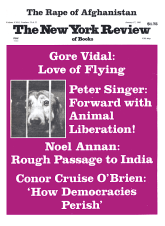In response to:
How Guilty Were the Germans? from the May 31, 1984 issue
To the Editors:
In connection with Istvan Deak’s fine article “How Guilty Were the Germans?” it may be pointed out that in 1943 the White Rose, a tiny group of anti-Nazi activists consisting of a university professor and a handful of his students, issued a pamphlet in which they stated that the Nazis were systematically exterminating thousands of Jews. The White Rose had no connections in the inner circles of the Nazi hierarchy. If they knew what was going on in Auschwitz and Treblinka, it can be safely assumed that everybody knew.
Joseph Machlis
Queens College of the City University
Flushing, New York
Istvan Deak replies:
Thanks are due to Professor Himka for reminding us of the Ukrainian tragedy in the Second World War. He is entirely right about the “Russian” prisoners of war who were in reality not only Russian but made up of all the people of the Soviet Union. And, of course, more Ukrainians fought the Nazi occupiers as Soviet soldiers or as partisans than assisted the Germans. Yet even the latter group’s behavior is made somewhat understandable if one considers that the Ukrainian peasants had had to suffer quite particularly from Stalin’s terrible collectivization drive in the 1930s, and that the Ukrainians, a vast and historic nation, had a perfectly good right to strive for independence.
Thanks are due also to Professor Machlis for mentioning the White Rose, a small group of Catholic students and scholars who are, unfortunately, little known in the United States, although much better known among young West Germans. Sophie and Hans Scholl, Professor Kurt Huber, and a few others at the University of Munich and elsewhere resisted Hitler not only in order to save Germany from ruin (which was the main goal of the heroic conspirators of July 20, 1944), but also to set new moral standards for young Germans and to protest the massacre of innocents. The White Rose had no illusions about the possible effect of their amateurish efforts to print and distribute leaflets: they expected to be executed. They accepted martyrdom in atonement for the sufferings of Hitler’s victims. Sophie Scholl and her friends knew well that thousands of Jews and others were being exterminated, yet I still believe that many Germans did not have this information and others who knew tended to ignore the information. How many, we shall never learn, because even those who were then aware of the horrors have by now suppressed the memory of that knowledge. Among those who must have known were the soldiers on the Eastern front, as well as the inhabitants of Munich, Weimar, and other cities in the immediate neighborhood of the concentration camps.
There were, then, those who did the killings; those who approved; those who knew but did not care; those who knew and disapproved but were afraid to speak up and, finally, those, a mere handful, who stepped forward and died for their courage. This is the terrible past that the German people must overcome and that they are indeed overcoming with some success, at least in the Western part of the former Reich. It is because of the German example that we must be grateful to Amnesty International, Helsinki Watch, Americas Watch, and similar voluntary organizations that keep reminding us that today, again, countless people are subjected to torture and death at the hands of fanatics in dozens of countries. These atrocities will not decline so long as the leaders of the two world powers care to notice only the terror in the opposite camp. There is no hope for an improvement until the two world powers and the world’s leading intellectuals agree jointly to oppose the present danger. Fanaticism is with us, never mind whether it claims to be fascist or “antifascist,” and whether it engages in its terroristic practices in the name of revolutionary socialism, religious orthodoxy, anarchism, nationalism, authoritarianism, or conservatism.
This Issue
January 17, 1985



